#anti little women 2019
Text
maybe a controversial opinion, but I didn't really like Barbie. It's not because I didn't get what it was going for, it just felt very selling-a-message while being just shocking enough to keep people talking about it. I do like the stuff about barbie as an idea (feminist vs not, what it means to be a woman, gender roles, etc) but that doesn't really make it a good movie with a cohesive plot that I'm interested in watching again. it felt like I was getting preached at, and I'm sure tumblr adores analyzing everything about it but it just wasn't for me. The ending also just feels like they didn't know how to end it.
Side note, I think greta gerwig is a terrible director who's getting way too much acclaim for being contemporary and having strong feminist themes, when everything feels super on the nose. It doesn't feel like good directing to me, it never feels like I'm watching a movie I can truly get lost in. I also didn't like her version of little women because again the themes were so on the nose, nothing felt organic about it, and she added a lot of modern feminism to what should've been very tied to the historical context of the source material. It was very jarring. I also hated the ending and what she did to Jo- Jo is her own character and is not Louisa May Alcott, and just because you do a bunch of on-the-nose critique of the book in the movie, doesn't make it suddenly a good, thematically strong scene to watch.
I think she just benefits from actors giving great performances in her movies and that's why the ratings are always so high, because if an actor can sell it, if it's well shot, more people will like it. It could also just not be for me but idk.
And there are good ideas, again, I would just prefer if there was a stronger plot and more cohesion between ideas. Feels like everything was written for a bunch of people online to talk about how deep it was. I support that, I support the feminist takes, but where is the meat of the movie? Where are Barbie's sisters? Where is the feeling that I'm watching a story rather than a bunch of ideas?
I also have a million thoughts about how Greta made barbie x ken a somehow bad thing but I will save that for another post.
#barbie#anti greta gerwig#little women#little women 2019#anti little women 2019#anti barbie#anti barbie movie
293 notes
·
View notes
Text

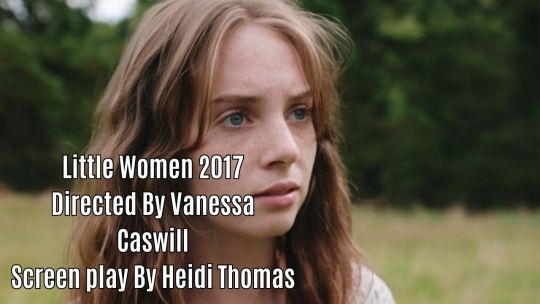
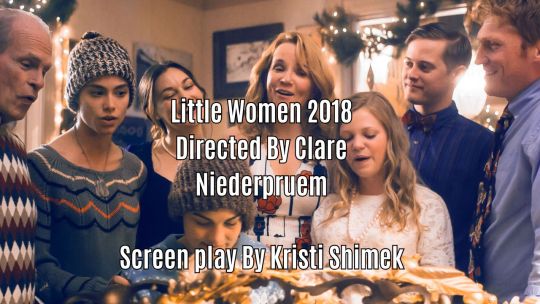
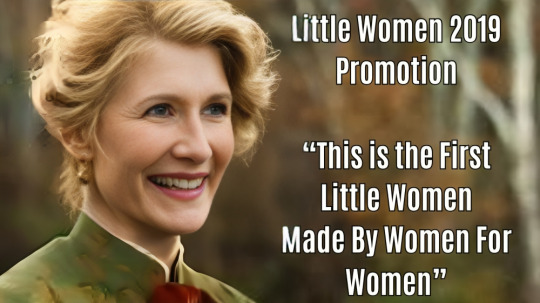
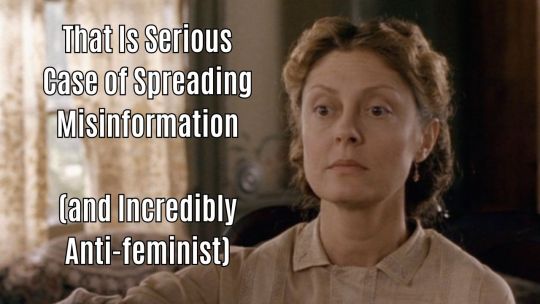
Just saying...
#slay#susan sarandon#laura dern#little women 1994#little women 2018#little women 2017#anti little women 2019#anti greta gerwig#greta gerwig#little women 2019
38 notes
·
View notes
Text
Controversial opinion:
It's a crime these two did not end up together
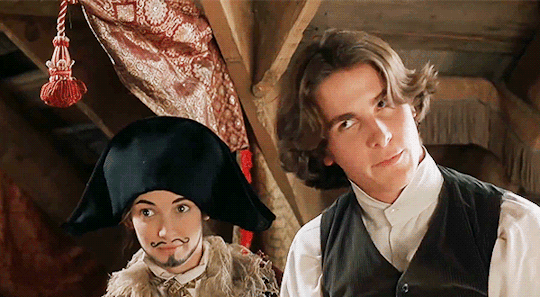


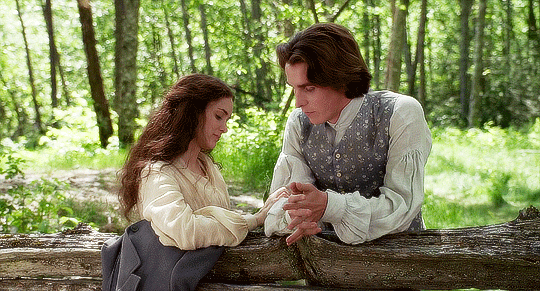

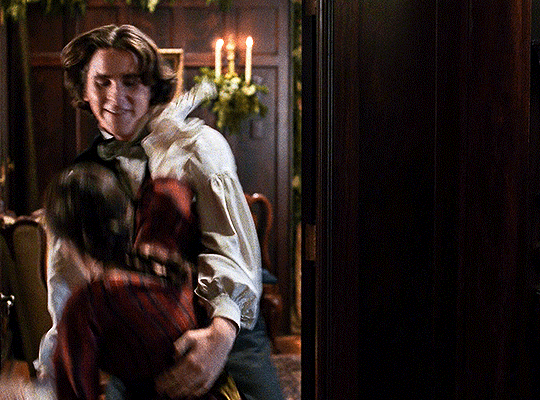
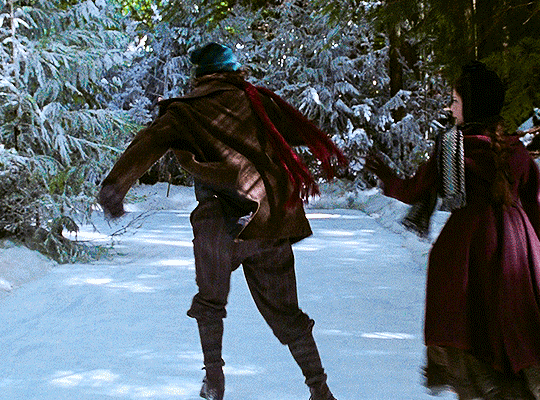
Talk about unsatisfying endings and ships. And they end up with the worst people possible! Laurie with Amy in Europe! Jo's Europe! Jo with that ugly older guy that keeps criticizing her writing. I rather they both be single that with those two!
(Don't like don't read. Post hate and I'll block you)
#my thoughts#jo x laurie#little women 1994#little women#movies#anti laurie x amy#anti jo x Mr bhaer#anti little women 2019#anti greta gerwig
20 notes
·
View notes
Note
My apologies if you have answered this before but I was wondering what are your thoughts on the portrayal of Jo in Little Women (2019)? I like Saoirse Ronan as an actress and I think she did wonderful in the movie but the role she was playing didn’t feel like Jo March at all. It feels like a completely different person with the same name. Does that make sense? Like Jo in the 2019 version is a different person than the Jo in the books. And honestly I was kinda disappointed because the aesthetic and scenery are lovely but the writing was not little women at all.
No worries, I don't know if I've ever done a full detailed explanation of my feelings on Jo's character in the 2019 specifically, so this is a good excuse to talk about it. I completely understand what you mean, her portrayal did not feel in anyway the Jo March I came to know and love after all the years. Let's explore Jo's character assassination.
When I first heard of the project, I was so excited because for a long while Saoirse Ronan was my first choice to play Jo. I have seen her in many movies from "Atonement", "The Lovely Bones", "Brooklyn", and I agree, I believe she is an amazing actress, and I was excited to see what she would do for Jo. On a technical standpoint, she did act very well in the film, but whether or not I felt she deserved an Oscar nom for the part is something different. I personally think she didn't deserve it, not because she's a bad actor, but I don't think what she gave for the character felt worthy of it, you know what I mean? If anything, I think Lupita Nyong'o deserved it much more for her parts in "Us" than Saoirse did for this film.
So where does the problem lie? The writing. I would like to have it on record, I am not one of those people that say that every book adaption must be 100% exact from page to screen, I am open for leeway, creative choices, and cuts, but what I felt was done wrong here was simplifying and changing characters to the point they felt like hollow versions of their flawed but beautiful book counterparts.
Jo is one of the most complex characters in the novel, as her arch starts as a 15 year old girl who is all tomboy and rebel to an independent but loving woman she becomes. We see her reject ideas of marriage because of the social pressures she feels to marry well and how marriage at the time was a loss of freedom for women, to understanding that being a woman isn't contained to one specific box, that she is able to be independent while also having a husband who supports her dreams. She has a temper, it isn't something she gets over as quickly as she has a moment of crisis, she learns how to handle it, like Marmee did. She has internal misogyny that colors her viewpoint of the world, especially women, to understanding that women are as different as each March sister is, and that doesn't lessen their worth as women. Are these lessons we find in the 2019 film? No, it isn't.
Gerwig wrote Jo as if she was trying to appeal to the masses, giving her contradictions that go against her growth and character. Seeing her yell at Friedrich, throwing a tantrum worthy of a kindergartner, and acting selfish throughout her adulthood when it's the time she is the lest selfish is so wrong for her. Jo as a child was not kind, I think we as a society need to stop demonizing a 12 year old Amy for getting fed up when her 15 year old sister continually picked on her for so long that she snapped and did something she came to regret. These are kids, they are meant to be flawed, even annoying, and yet, so many people try to raise child Jo up as if she is the symbol of feminism when she was anything but. And Gerwig followed suit.
Throughout the movie, Jo acted so childish and it was portrayed as liberating, that her maturing means a sacrifice of her true self, that it leaves her sad and alone, and I feel like this is the opposite of real life. I am about to be 30 in a week, and as I have reflected in my life, I have never felt more like my true self in my whole life. It's because I had trials and tribulations to challenge me, question how I see the world, what do I want, where do I wish to go? These are questions we all go through as we get older, and it doesn't mean that we grow older and sadder, it means we change and become more self aware, closer to who we may truly be than anything else. And never forget, there is still so much life ahead, we have so much to learn, plenty of time to become who we ought to be. As David Bowie said "Aging is an extraordinary process whereby you become the person you always should have been."
Jo by the end of the film gains no character arch, she remains practically the same, having issues with change, relying on the familiar rather than ready to explore the unknown, going back on her feelings on Laurie to the point of writing a letter to accept him, which NEVER happened in the book, as she stayed firm on her resolve that she didn't love him romantically. The lack of an arch for Jo means we don't see her grow up, she stays this perpetual 15 year old girl who is selfish, can't take criticism (which book Jo gladly did as an adult), is pressured by her sisters to chase after a man she didn't even seem that interested in (if you go with the one ending), or ends up sad and alone with her book which is what she didn't want to do as she proclaimed she was lonely (if you follow the other ending). Her story is unsatisfying, as it paints her this tragic figure that never got what she wanted in life, despite that not being the case.
She gets to open a school that helps underprivileged kids to get an education, she gets to become an author in the following books, marries a man who loves her not only as a wife but as an equal, has children she loves dearly, and by the end feels she has had a fulfilled life that she wouldn't have traded for anything in the world. Gerwig didn't seem to understand that Jo could be all these things and decided to stick with what she wanted the character to be, but knew she had to satisfy the divided fanbase, hence the confusing ending and character that is Jo March.
Gerwig tried to add in elements of the real life Alcott, thinking that the idealized version of Jo and she were exactly one in the same, but it's not true, as Alcott did long to have a family of her own, had been in love with Henry David Thoreau, and wrote the character of Friedrich Bhaer as the expy of him to be with the expy of her. If Gerwig truly wanted to respect the wishes and vision of Alcott, she didn't need to look further than the wonderful novel she wrote over one hundred years ago.
In the end, the Jo we see in the 2019 film is nothing more than a hollow shadow of a great literary character that was destroyed by someone who, like the people she pandered to, never quite understood Jo in the first place, and therefore didn't deserve her.
16 notes
·
View notes
Text
Tell me you didn’t read Little Women, without telling me you didn’t read Little Women?

He has zero understanding of his character!!!! The more he talks about it, the more dirt he throws at it.
And Florence is the same. Maybe if they would have actually read the book, they would have know who these characters are!!!!!
The audacity to compare Amy and Laurie with Paul and Irulan!!!!
16 notes
·
View notes
Text
the "I just. I just feel like women-" speech in Little Women 2019 and the "it is literally impossible to be a woman" speech in Barbie 2023 activate my gag reflex so fast. tell me you're a bad one-trick-pony writer who loves to whine without telling me you're a bad one-trick-pony writer who loves to whine
#anti greta gerwig#barbie#barbie movie#little women#little women 2019#lw#greta gerwig#greta gerwig barbie#greta gerwig little women#feminism#anti feminism#tradfem#traditional feminism#writing#writer#doverstar's thoughts#opinion piece#text post#like? shut up? you are so obnoxious. you are SO obvious#women aren't suffering because they're female. women are suffering because they're human#men suffer too#men are insecure too. men have expectations placed upon them too#but because we're women there needs to be movies where we talk about how hard it is for us specifically to exist? no#guess what? we don't need you to romanticize our common struggles#we don't need you to use a movie about a doll children love to play with to preach your feminism sermon at us#give me princess and the pauper or give me nothing. barbie 2023 sucked#terrible writing. excellent costumes excellent acting. awful awful messages#awful awful writing#sitting and watching america ferrera (who is great) onscreen for like 5 whole minutes talk about how hard it is to be a woman wah wah wah-#-that must have been so boring and so weird for children in that audience. it was so on-the-nose. it was not written well at all
72 notes
·
View notes
Text
going on a little women (2019) rant real quick, and i know i'm not the first one to say this but i just needed to vent it out anyways. whenever i hear someone say that jo and laurie should've ended up together, my first thought is that they are basically ignoring the entire premise of jo's story and of how she never once saw laurie in a romantic light or had any romantic feelings for him and of how she always viewed her relationship with laurie as platonic. and she had stated she wanted to be with him, but not because she was in love with him, it's because she wanted to be loved. which i completely get, honestly. the feeling of wanting to be loved comes in many different forms and different meanings when looking into a character and studying that character. there is a reason why jo and laurie didn't end up together. that scene where she said they'd be unhappy if they got married is very true, because feelings would not be romantic on jo's side specifically. especially with her trying to push herself into loving a man she had known since she was so young, but she never saw him in that way that he did with her. she'd be unhappy in a loveless marriage because she couldn't love laurie the way she wanted to, in the way he loved her to make it easier, but it's not always that simple. you guys don't have to ship amy and laurie together, that's fine. but saying that he 'settled down for her' is not what it is. especially that laurie hadn't had any contact with jo in a few years after meg's wedding, and he saw amy in a way he didn't before. he fell in love with amy, (and he even told jo, that the love he has for amy is different than the way he loved her once upon a time, because a silly childhood crush when he was younger is way different than a more mature love when he got older) and wanted to marry her
basically, if anyone says that jo and laurie should've ended up together, you guys are exactly like mr. dashwood that refused to publish jo's book because the main character didn't get married to a man at the end. ignoring everything of what jo's story and her character was about. and also really and obviously are not paying attention to some of the scenes
#also this is me talking more in jo's pov than laurie's because I think it's mostly because I just simply understand most women more so...#little women#little women 2019#jo march#theodore laurence#any march#anti jo x laurie#amy x laurie#jaiden rants
546 notes
·
View notes
Text
Modern feminism is anti-sacrificial-love. See if you can prove that statement incorrect.
#Especially if you look at all the pro-feminism content changes to story remakes#little women 2019#the little mermaid 2023#Feminism#anti feminist
24 notes
·
View notes
Text
period drama bitches need to keep AWAY from little women (2019) when complaining about persuasion (2022). if anything, little women 1994 was the one that committed the fatal flaw of the new persuasion – misunderstanding its characters in order to make them more palatable. think about it: meg was nothing more than the sister who disappears into motherhood and marriage, and never mind all her struggles with those; jo reduced to her spunkiness, not to mention being romantically interested in both laurie (and bhaer, but that's more of an interpretational note lmao); beth is sickly and has no relationship with mr. laurence, therefore removing the deep impact she had on her community and making her death nothing but a tragic spectacle for jo to write about; and amy is a spoiled brat who gets whatever she wants, including laurie, despite lacking any connection with him. much like how this is Not Anne Elliot, those were Not The March Sisters – they were versions of complex characters who were watered down into someone #relatable and #feminist, but only a certain kind of feminist. lw19 understood the marches, the limitations of their era, and the ways that they diverged from cultural norms (as the alcotts did as well), and just because it lacked corsets or whatever doesn't make it some abomination against the period drama. thank you!
#also idgaf about the bonnets. they're bonnets. go to colonial williamsburg if you need to see an ugly hat that badly!#bonnets are somewhat valid but lw19 haters turned me into a bonnet anti sorry#same with corsets honestly like ik they aren't evil + it's valid to not like costume inaccuracy#(but just like ppl don't like wearing bras now they didn't all like wearing corsets then !)#persuasion#persuasion netflix#dakota johnson#little women#little women 2019#jo march#greta gerwig#notes#don't even get me started on those damn ugg boots that the actresses wore OFF-CAMERA TO BE COMFORTABLE#IT WAS WINTER IN MASSACHUSETTS. THEY WOULD HAVE DIED.
228 notes
·
View notes
Note
The only thing Greta got right in the Little Women press was that Laurie and Amy have great rapport in the book, and they do want to fuck!
It's here in case you'd ask.
Ay, anon, you made me go read that and got me riled up all over again XD
In this case, I honestly apply the "broken clock right twice a day" XD because I have grown to think that she's just... incompetent. Going from Frances Ha to Ladybird to Little Women, there's such a sameness in the ideas and themes and a lack of growth in her storytelling that hmmm....
And in the case of Amy, and Amy and Laurie in LW in particular, I'm always confused when people say that this movie makes them more justice than any other adaptation before, because I just... can't see it.
The movie defines Amy as a character, in the way it develops her character, so to speak, by her Jo envy and her helpless lifelong infatuation with Laurie. There's a little dedicated to Amy's art (I do particularly like the translation of genius-not genius to realism-impressionism, and I appreciate that her first scene is her with her art), but compared with how Jo's art is portrayed in the movie, it's not enough. And it's not enough because Jo's relationship with her writing in the book is utilitarian for the most part: she writes on one hand to explore the fantastic from the safety of her pen, and on the other... because it brings money and money buys necessities and niceties for the ones she loves. Even when she says she wants to do something splendid, that something splendid isn't defined as writing a literary masterpiece.
But Amy's drive to become a famous painter is something she is set on and longs for with great intensity since she's a child. She doesn't make art because it's cathartic or profitable, but because it is a passion to her. The realization that she's not a genius is a heavy disappointment, comparable to Laurie's disappointment in Jo's refusal and the mediocrity of his own musical talent.
Gerwig gives Amy, in the moment of the most raw emotional revelation, the line I have been second to Jo my whole life. And that to me is such a betrayal of the essence of her character. Amy does not want to be Jo, never wanted to be her. Even her special relationship in childhood was with Meg. To be elegant and pretty and move in society are things she always liked and wanted and worked for. The line itself colors the whole of Jo and Amy's relationship in the movie, and it does little to dispel the notion that Amy is just getting Jo's leftovers, while attempting to make her an object of sympathy, because she wanted to be fabulous Jo and couldn't, so now we as an audience can be comfortable forgiving her for performing conventional femininity.
Is this really more accepting of Amy and her desires than adaptations that just... don't give Amy Jo-envy?
At the same time, the movie fails to show a single shred of Jo growing to admire Amy's good qualities as they age. If anything, Jo's resentment towards Amy grows. The movie puts the I get all the work and Amy gets all the fun line, not when Jo learns she's not going to Europe and is having a battle with her own feelings over that disappointment, but when she's coming home to take care of Beth. It not only makes Beth (and by extension, chronically ill people) as a burden on their healthy family members that bothers them and would be better off dead already, but it also makes of Jo a cold bitch that will tell out loud to her mom and sister that she'd rather be in New York or Europe than by the bedside of her dying favorite sister. By the end of the movie the script explicitly says that Jo wants to slap Amy when she meets her again after her return.
So, I wonder... is this better development for their relationship than Jo being visibly happy of seeing again the sister she had not seen in years now, like in 1994, or having a quiet moment after Fritz Bhaer arrives where they talk and Amy tells Jo how much everybody loves Fritz and how happy she is for her, like in 2017?
Then there's the Laurie affair. The movie completely fails Laurie's character in two ways: book!Laurie is a very charming, emotionally intense man. Timothee Chalamet is the embodiment of every languid, annoying rich Edgar Allan Poe protagonist. Laurie should be the kind of person that does a lot of stupid things, but he's so charming and lighthearted and emotionally honest that you cannot help but like him. This personality aspect informs the way in which both Jo and Amy see Laurie: Jo sees a rascally son, Amy sees the spontaneity and vitality that she lacks herself.
How is this any better than Christian Bale, who at least is cheerful, and Jonah Hauer King, who at least attempts the inner turmoil of the character?
The second way in which the movie fails Laurie is in failing to give him any growth. Putting aside Greta's hilariously wrong idea that Laurie's proposal to Jo is his attempt at becoming an adult (completely unsupported by the text), once he has that discussion with Amy, he drops off the face of the earth, to reappear at the end and kiss Amy. This creates a chain reaction that transforms Amy into a passive victim of love.
Consider this:
Amy's crush on Laurie in her childhood is painfully and embarrassingly obvious and made known to Laurie through her insistence in her having pretty feet (seriously, why, why, why). She tells him about her pretty feet, makes the mold of her foot for him (instead of, you know, as part of her hard work to develop her art, as it is in the book)... it's impossible that he didn't notice, but he acts like he didn't. We do not get a single scene where they interact one on one in the past, or in which they have easy friendship.
So... how is this better than, say, the way 94 shows Amy's interest in Laurie by watching him from the stairs where she cannot be seen by him, or her telling him about her fear of death?
Speaking of which, let me make an aside here about the "I will kiss you before you die" bit that people seem to hate so much based on some outrage about a 17 year old guy saying that to a 12 year old girl: it serves more than one narrative function, very economically: it establishes that Amy cares for Laurie and trusts him, it shows us that Laurie likes Amy and indulges her, and more importantly, it's set up that is paid off in Europe. There Laurie tries to kiss her as he reminds her of the promise he made to her... and she refuses his kiss, because she has changed and he has changed and their dynamic is completely changed. And he's also taking something he said once as a comfort move, and turns it into something that allows him to do what he wants. And Amy will have none of that, because her sense of self and what she deserves as a person has grown: I do not wish to be courted by a man who is still in love with my sister.
And what about 2017? 2017 gives us a full sequence of Laurie and Amy during her time at Plumfield, including the Amy's Last Will and Testament plot.
Is that not better than 2019's first part dynamic?
But what about their Europe dynamic?
In the book Laurie runs towards Amy when he sees her driving her own carriage around. In the movie, Amy runs after Laurie once she sees him, as she's riding by the side of aunt March who is pestering her, because she has always loved him.
Invited to the Christmas Ball, he not only stands Amy up, but arrives drunk, with other women, and publicly humiliates her and Fred Vaughn. He never even apologizes for this, and Amy does not demand an apology from him. In the book he comes in time to pick her up, and because he makes one comment in which he implies he still sees her as a child, she fills her card with other dance partners and "punishes" him by showing him she can do without him. And so he starts to learn to see and treat her as an adult.
Then the movie gives us the studio scene, where two things about this relationship happen: one, we get the choice-fate in love conversation that ends with Amy's long speech about marriage, to which Laurie doesn't answer anything either in acknowledgement or response, and then he tells her she's beautiful once and all is forgiven and forgotten. How cheaply is Amy bought off, eh. Even a modern romcom would have the heroine slap the shit out of the leading man's face if his attempt at anything close to an apology was just telling her that she's beautiful.
So then we have the Valrosa scene that has it's okay parts, although it contains the awful second to Jo line, and then... Laurie asking Amy not to marry Fred Vaughn, coyly implying that he wants to marry her himself. Putting aside the fact that, for a movie that apparently means to give Amy her own stature and independence, it cannot stop making Amy and Laurie scenes about Jo one way or another, by simply having those two additions, the scene is made worse than the 1994 one and it's also awful I always knew I'd marry into the March family line.
And that's because even that version, while inventing the "Laurie asks Amy not to marry Fred" that 2019 takes from it, understands that this has to happen A) later B) in the context of Laurie asking for a chance to prove his worth. He writes Amy a note telling her he loves her, that he's going back to his grandfather and that he's going to try and prove himself, and he asks her for the time to do so before she makes a decision: don't do anything we might regret. But 2019 Laurie not only asks it out of the blue, but does it without an express declaration of love, without apology, and without any offer of changing his life. Granted, book Laurie doesn't ask for anything, he goes and tries to prove himself because he's half inspired by her resilience, half nettled by her criticism, so both movies fail there, but to me 1994 clearly does it better. The bar is low.
(2017 completely foregoes having any of this by erasing Fred Vaughn and changing Laurie spiraling to "Laurie is sad", so it's difficult to compare in terms of choices).
People do love Amy telling Laurie that he's mean in 2019, but this is completely cheapened by the fact that she then goes and breaks up with Fred, and when Laurie comes back after Beth's death (again, we don't even know where he was or what was he doing), she very meekly tells him what she did and that she doesn't expect anything from him... and I'm sitting there in the cinema and saying... where's my Amy March? Who is this shy woman, perpetually in love with an asshole that cannot acknowledge her when she's young, who does not apologize for his wrongs, that does not change his ways, that doesn't even have the courage to tell her he loves her while asking her to cut ties with the man who actually put in the work to court her and who risks a lot by marrying a penniless American girl? Why is she the one that sounds apologetic here?
How is this any better than Laurie receiving a letter from Jo telling him of Beth's death and asking him to come home, and his immediately leaving London to... go to Amy, because that's the first person he thinks about? Where all Amy tells him is "Oh, Laurie, I knew you would come" because she knew that he loved her?
As a sidenote, I still think that the way 1994 includes Amy's pinching her nose with a clothespin as a child is set up for the visual representation that Laurie notices her and knows what her insecurities are and loves her whole, specially in those things, so he touches and kisses her nose first in that final meeting after Beth's death, which is different from the way he bopped her nose when he first met her in Europe? Now that's attention to detail and visual storytelling and not... scarves of different colors, sorry Jacqueline Durran.
And then there's Amy in 2019 being sort of ashamed and scared of Jo when she meets her again at her return, as if she had something to be ashamed of.
Again, how is this any better than Amy being happy to see her sister and happy to see her happy?
Then, there's their married dynamic, which I thought was fine, it was fine in 2019, despite my gripe with Laurie telling Jo Amy calls him "my lord" and omitting he calls her "my lady", and the fact that half of it is meant as mockery of the Jo/Fritz ending of the novel.
I digressed hard, anon, sorry, but I have been meaning to write this down for a while now, and you gave me an opportunity.
#Little Women#anti Greta Gerwig#Little Women 2019#Little Women 1994#Little Women 2017#Anonymous#ask#Amy March#Laurie Laurence
103 notes
·
View notes
Note
Genuine question: why do so many people talk about Meg like she's vain? Like, how is wanting nice things and wanting to fit in 'vain'? I can understand people saying that about Amy, especially when she's a kid, but Meg is the sweetest of the four sisters next to Beth? And isn't vanity being too self-important? Am I missing something? (Sorry for all the questions, but I just do not understand)
I don't mind questions at all. Keep them coming :)
I have often wondered this myself. I wonder if it has something to do with Meg being more a feminine type of girl, and people attack her simply because she likes to be girlish and femininity is often connected with vanity. I don't know.
In the book, like you said Meg is not really a vain person. The whole Vanity Fair chapter, is really more about self-discovery and Meg's thinking about her own self-worth. These other rich girls, they treat her like she is a doll and they play dress-up games with her. In the end, Meg even said she could not recognise herself any more.
The 2019 film, completely missed the point in this (once again). Gerwig said that "Meg needs a day of from her miserable life". Meg in the book never thinks her life is terrible. Yes, she is poor, but in the end of the Vanity Fair chapter, it feels more like "I would not change my life for the lives of these girls. It is so hollow". If the person only watches 2019 film, and takes that narration, no wonder people think that Meg is a vain person.
I also think it is really hypocritical sometimes, the way Meg gets criticised, when she buys the silk for a dress. She was very poor and getting luxury items was pretty rare for her. That is not something a poor girl should be condemned. If we think about Laurie, he is written to be very dandy. A nice looking young man who likes to take care of his appearance. Jo even criticises how he buys expensive gloves and perfumes what not. Nobody, ever critices Laurie for that.
Total double standards.
Also, Laurie was a metro-sexual, before metro-sexuality was a thing.
24 notes
·
View notes
Text
Controversial opinion:
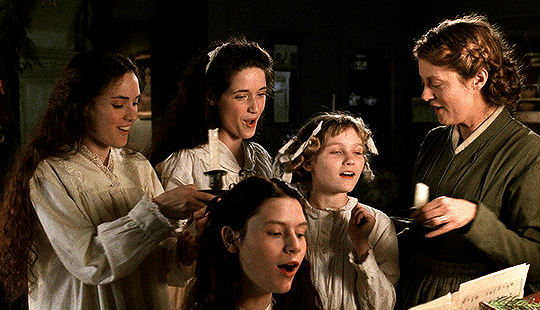
little women 1994 is the superior version in every other way to me(though I am bias because I refuse to watch any other version because any other version does not exist to me). It's a great movie. It's my little women.
(Don't like don't read. Post hate and I'll block you)
17 notes
·
View notes
Text

Ok, I don't normally post replies like this, but this was just ridiculous to me. So, this person made a post saying "Little Women 2019 not getting a best director oscar nom is just flagrant sexism." I responded that I felt the 2019 didn't deserve any of it's nominations, and this was their reply, followed by blocking me.
It's honestly hypocritical of them to say this, calling me a "coward" for not reblogging it, but then blocks me so I won't have the chance to do so, or to have an adult conversation on why I thought so. Listen, I will not agree with those who say this movie is good, but I am at least willing to discuss the topic, and I didn't say it with harshness or any cruelty, just that in my honest opinion, it wasn't that good.
When you post something like this, it does make some people want to make comments or lead into a discussion, so that should be expected. If you don't want random people to make comments on your post, or if all you want is for people to agree with you, you can disable it so you won't have this issue, but don't call people names just because they didn't agree with you.
3 notes
·
View notes
Note
I wonder if this is your experience too. When I have read Gerwig's interviews and basically anyone that was involved in making Little Women 2019, they are filled with contradictions. In one interview she says one thing and in another one something completely different.
I have started to feel that Gerwig doesn't have any kinds of original/personal opinions about Little Women. She goes where the money is (basically trying to please anyone everywhere).
Hi Ninna! Sorry for the late reply, this week has been a bit chaotic 🙃
Mhm... I'd have to watch them again, but they annoy me so much now. Do you have examples?
I do remember moments where Greta tried to appeal to Amy fans and say Amy and Laurie were perfect for each other. And that they decide to grow up together. But then she would speak to JoLaurie shippers and how Laurie was the mature one during the proposal 🤪 🤪 🤪 🤪 🤪 . So, which one is it?
I also remember Saoirse just repeating Greta’s words, Timothée having no idea of his character, Florence just over-the-top praise to Greta. Basically, they all just repeated what Gerwig said, which means no one actually read the book. And of course, Emma Watson saying how Meg’s dreams are also valid but the tone of her voice was the contrary. Like, you can know when an actor is excited about a role. And she was just there for the paycheck.
8 notes
·
View notes
Text
Greta Gerwig's Filmmaking Has Become Anti-Feminist: My Predictions for "Feminist" Film in the Near Future
Greta Gerwig has created an image of feminism for herself. With Lady Bird subverting expectations and becoming an icon of feminist filmmaking. Once she took on the challenge of little women, she set herself up for failure.
Little Women is a beloved but outdated depiction of a group of sisters living through the Civil War. Gerwig mentions the expectation for women to end up in a romantic relationship at the end of classic stories, yet she gives us this ending anyway. At this moment, Gerwig is a subject of the creation before her. Little Women is a story that everyone knows. She is involved in a system that expects her to write a story that has been written for her. She tries her best to include feminist themes in the classic story but it ends up coming across as disingenuous. It feels like an attempt to dodge potential feminist commentary on the film before the film is ever released.
This is not entirely her fault, as she becomes involved with projects that are recreating a classic story or telling the story of a beloved doll, she puts herself in a box and becomes the system she fights against.
As Gerwig grows in popularity as a director and writer, she finds herself more and more in the political spotlight. She is expected to take on projects that have feminist themes, like Barbie. Mattel has been criticized for the sexualization of Barbie and the singularity of her body image for decades. Only recently, in 2016, did Mattel release more body types for the popular doll. This change was only implemented after a major profit crash for the toy company because of the criticism of Barbie.
Gerwig has become involved in an inescapable industry where profit is the main priority. The Barbie Movie has been criticized for its "half-baked feminism" before. But this is not what I seek to achieve. Barbie is another story that has been told time and time again. Gerwig has involved herself in a narrative that already exists. Like in Little Women, she attempts to avoid commentary by throwing in lines like "Margot Robbie is too pretty to say that she's not beautiful." This does not make the audience feel better about themselves, it does the opposite.
The Barbie Movie has victimized Barbie. Creating a "real girl" that feels the impact of misogyny. In the movie, Barbie is a victim of Mattel and their agenda. When in reality, Barbie is the product of Matel and their agenda. When their agenda is profit. all the while, Mattel is portrayed in the movie as silly little men who can't tell the difference between two blonde women. The true driver for the company has been hidden behind pretty colors and Will Farrel. It sounds silly because it is supposed to.
Greta Gerwig has dug herself into a system that by definition uses feminism as a veil to generate profit. Barbie as a company is too far gone to be truly feminist. Gerwig's involvement in the film is the only thing that keeps me believing that the film is feminist. But the more I think about it, the more I believe that Gerwig is veering further away from feminist ideas with every film she puts out.
The goal is not to "have it all" (the saying being misogynistic altogether) yet there are still the narratives that movies like Barbie are pushing out. To create truly feminist media, directors like Gerwig need to abandon the big-money deals that keep pulling them in.
Barbie was destined for failure since its conception as a film. The goal of feminism is not to make life as bearable as possible under the patriarchy but to dismantle it altogether. Yes, I am using Barbie as a brand as a metaphor for the patriarchy. Let me live. By becoming involved in films like Barbie, Gerwig is participating in the system that is capitalism. Capitalism is inherently anti-feminist. Barbie's image has always been about buying. Barbie is not all of the careers that she claims to be, she has all of the clothes for them. Since the beginning, Barbie has been about consumption. Mattel sells the idea that to be like Barbie, you should buy all of the outfits and accessories that go with whatever career you want! Because girls can do anything boys can do!
Barbie was never about encouraging girls to be whoever they want to be. It has always been about pushing out more Mattel products to children. The movie falls victim to this narrative too. The matriarchy of Barbieland is a mirror image of the patriarchy, just with women in the leading roles. This is a perfect illustration of my criticisms of the movie. Instead of breaking out of the cage, Gerwig contributes to it. A true matriarchy looks nothing like our current society. The way our society is designed is created for men.
Here comes the parallel: the way Barbie has been designed by Mattel is created for our current, patriarchal society of consumerism and capitalism. The movie is a victim of this too. As long as we create media within the confines of previous narratives and under larger institutions, the media will be inherently anti-feminist. No matter how "feminist" the director may be. No matter how many random lines they add to the subtext to avoid feminist attacks on their film. The film was never feminist. Once the idea was conceived, it mirrored the ideas of a patriarchal society; a cage that can be criticized from the inside, but not broken out of.
AN: hey! thanks so much for reading! this post was originally a twitter thread on my account @/dyke5ever if you'd like to check it out.
this post was kind of half-assed, i didnt really dive into my arguments as much as i would have liked to but i plan on writing a take on allan and why women love him as a character so much later, so i will jump into more feminist themes in that post.
#the barbie movie#barbie 2023#barbie#greta gerwig#feminism#gender roles#film#little women#little women 2019#capitalism#anti capitalism#filmmaking
8 notes
·
View notes
Text
experiencing that quirky mental illness thing when you feel so intensely you get physically sick. smile.
#talked about a Lot of my current bpd stuff with my therapist today and by god am i going through it#gonna try to talk about it later this week with my friends#but until then. time to shred anti-hero on the guitar while watching little women 2019 and being a silly little jo kinnie
1 note
·
View note